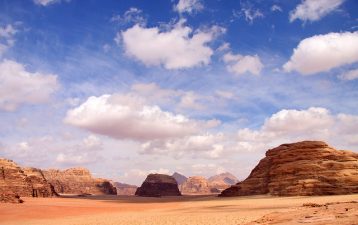 If you know water issues in the Middle East, then Gidon Bromberg, the Israeli director of EcoPeace, Friends of the Earth Middle East (FoEME) will need no introduction.
If you know water issues in the Middle East, then Gidon Bromberg, the Israeli director of EcoPeace, Friends of the Earth Middle East (FoEME) will need no introduction.
Bromberg, with his Palestinian and Jordanian colleagues won a Time Magazine environment hero award in 2008 for their work at FoEME, a regional organization that brings together Jordanian, Palestinian and Israeli environmentalists to promote sustainable development and advance peace efforts in the Middle East.
FoEME is running several water projects that involve the rehabilitation of the Jordan River, protection of the region’s mountain aquifer and regional water cooperation for peace.
He was the perfect to interview for our water series, being done in partnership with the Strategic Foresight Group.
From this series, we hope to gather information and answers that will influence policy makers to help develop a sustainable water culture in the Middle East. And also to lead journalists in the right way when they are investigating the true nature of this regional conflict over water. Today we ask Bromberg 5 questions, the same questions we’ve asked Israel’s Water Commission office, and before that Shimon Tal, the past water commissioner of Israel.
Here are our questions for Bromberg:
Q1. Turkey and Israel have had talks about freshwater supply and purchase in the past. The Turkish government has been positive in its overall response so far but there is some opposition to this in the Turkish political spectrum. If the Turkish government were to agree to supply 1 BCM of freshwater to Israel, is there a possibility that Israel will agree in return to share this water with the Palestinian Authority (PA) and Jordan?
A1. Water allocation from shared water resources is governed between Israel and Jordan by the Peace Treaty of 1994 and between Israel and the Palestinian Authority (PA) by the Oslo Accords. Any water importation from Turkey to Israel will not be supplied as a gift but purchased with hard currency.
Israel could be a conduit where by Turkish water could pass through Israeli territory on its way to Jordan but that would need to be paid for by Jordan. Turkey, if it were to choose to, could import water directly to Gaza and from Gaza the PA could supply water to the West Bank. Israeli involvement is not all that necessary.
The resolution of water resource issues between Israel and Palestine should involve a fairer allocation, in favour of the Palestinians, of the shared waters of the Mountain Aquifer and access and riparian rights to the Jordan River system.
Q2. Israel is counting on desalination as a major source of its future water supply. However, there are limits to the growth of Israel’s water supply based on marginal water alone. What are the other ‘regional’ solutions that Israel can examine in terms of water cooperation with other countries?
A2. Israel’s current desalination program poses serious problems to air pollution, greenhouse gas emissions and marine pollution. Current levels of desalination proposed will also act as a disincentive to water conservation.
Israel’s focus on the supply side, and management only through massive expansion of desalination is not sustainable. Israel should see desalination technology as the last option rather than the first, and focus on the demand side of management as a means to meet fairer water allocation levels with the Palestinians.
On the regional level Israel, Jordan and Palestine (hopefully to be joined by Syria and Lebanon), must cooperate to rehabilitate the lower Jordan River and Dead Sea – based predominately on demand side measures and cooperate together to be world leaders in wise water use.
Q3. Lebanon’s Litani River has a particularly high quality of water, with a very low quantity of chlorates and nitrates present. Water cooperation with Lebanon would therefore serve Israeli interests but in order for this to happen, political cooperation between these two parties is required; in addition Israel-Lebanon relations are inter-linked with the Israel-Palestine conflict. Is it worth it for Israel to find political cooperation with Lebanon in order to secure its water situation or is this not a practical option?
A3. Climate models predict that due to climate change the Litani River in Lebanon will this century cease to flow into the Mediterranean with Lebanon requiring all of its water. Israeli-Lebanese water cooperation should focus on wise water use and fair allocations and sustainable use of the shared tributary to the upper Jordan River.
 Q4. Technical reports suggest that over-pumping is leading to the depletion of groundwater aquifers in the West Bank, both in terms of water levels as well as water quality. This could cause water shortages in the short-run and devastation of the eco-system in the long-run. What can be done to preserve these aquifers?
Q4. Technical reports suggest that over-pumping is leading to the depletion of groundwater aquifers in the West Bank, both in terms of water levels as well as water quality. This could cause water shortages in the short-run and devastation of the eco-system in the long-run. What can be done to preserve these aquifers?
A4. The ground water is a shared aquifer called the Mountain Aquifer unfairly shared between Israel and the West Bank. Over-pumping by Israel can cease based on policy changes at the political level. Once a Palestinian State is established arrangements will have to be agreed on for shared management of the joint aquifer.
FoEME has developed a paper on what a model water accord could look like. The second issue is pollution of this ground water mostly from Palestinian urban and rural sewage with the addition of smaller qualities of Israeli settlement sewage. Donor funds are urgently needed to build sewage treatment plants for the Palestinian communities. Agreements are now firmly in place between Israel and the PA to advance these projects if the funding can be found. The Israeli government must fully enforce laws to cease settlement pollution.
Q5. Israel has experienced a severe drought period in the recent past. With environmental neglect and the effects of climate change, this can be a frequent and imminent risk in the future. What can be done to minimize the impact of such a danger in terms of national measures as well as well as regional cooperation?
A5. Demand management in the urban, industrial and agricultural sectors needs to be at the forefront of sustainable water policy in Israel. Increasing the price of water in Israel is needed to better reflect its scarcity and its importance in providing ecological services. Together with the removal of water subsidies and trade barriers on the import of fruits and vegetables, rural communities in Israel need to be supported to promote alternative incomes. Appropriate domestic water technologies need to be introduced through regulation, such as rainwater harvesting, grey water reuse and waterless toilets.
A smaller measure of desalination (300mcm) is still required to guarantee domestic water supply during long periods of drought. Regional cooperation is required to more fairly allocate shared water sources between Israel and Palestine, to learn from best practices in demand and supply side management and for the rehabilitation of water systems such as the lower Jordan River that have been devastated due to unsustainable water policies in place by all sides.
To read more about this water series, see:
Read our interview with Israel’s Water Commission
Interview with Israel’s past water commissioner, Shimon Tal
All the Water in Israel: Interviews with Government, Analysts and Researchers
The Agricultural Roots of Israel’s Water Crisis
Israel and Jordan’s Red Dead Debate
Israel’s WATEC Water Conference, Makes a Splash




An excellent response that sees long term usage patterns. Gidon focused his answers on the need to reduce demand (waste of water). Since this interview, Israel has begun distributing water saving devices for showers and taps in homes throughout Israel. Israel is also changing it’s water pricing policy, allowing each person 2,500 liters of water per month. Any use above that will have a reasonably heavy price tag. This creates further incentive to learn and use water saving measures in the home.
The article only briefly mentioned that overpumping can devestate the eco-system in the long run. This is a serious issue that needs to be explained. As water is over-pumped, a vacuum is created under the ground, pulling up salty water, which mixes with the sweet water doing irreversable damage. This saltwater cannot be removed once it enters. The simple problem is that we’re using more water than nature provides.
Israel also has a very well developed wastewater (sewage) treatment system for over 90% of it’s population, where wastewater is cleaned and then re-used in orchards. But, smaller communities do not have adequate sewage systems, and this issue needs to be addressed, by using small scale sewage treatment approaches, such as Living Machines.